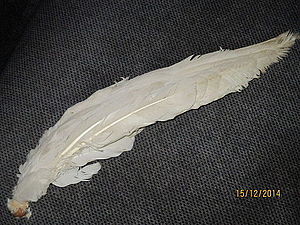Flederwisch
A flederwisch (also wipe ) is a duck or goose wing that is used as a hand brush . The tool is the predecessor of the hand brush, stable, very light and versatile. Bat wipes wear out quickly and are no longer usable after contact with moisture. However, they hardly get dirty when used dry, as they are naturally water-repellent.
Manufacture and use
Bat wipes consist of complete wings or just the wing tips, which are obtained during poultry slaughter and are dried without further processing. They contain the wing feathers, the finger, hand or forearm bones of the animals that are still in the wing, as well as the muscles and tendons that harden as they dry and stabilize the wing very well. The wing must be brought into the desired shape before drying. A subsequent correction of the wing shape is no longer possible.
The swab can be held on the forearm bones or folded into a bundle, which also allows brooms to be made. At first they sweep very well and cleanly and can also be used to clean tables or to sweep dust. With new bat wipes, the smallest dirt and dust as well as soot (e.g. when cleaning an oven ) can be removed. However , they wear out quickly and can increasingly only be used for manual activities such as wood carving or the sweeping of husks . They are still used today in rural areas. Beekeepers prefer bat wipes to sweep the bees off the honeycomb, as the soft tips of the feathers do not roll or provoke them excessively.
In general, bat wipes are replaced by fresher specimens faster than hand brushes. They also disintegrate on contact with moisture. But even when dry, they offer an ideal breeding space for mites and other small vermin that feed on organic material due to the bone and muscle tissue they contain . Bat wipes cannot be cleaned, are now considered too unhygienic in the home and have been largely replaced by sweeping devices with industrial plastic bristles.
Origin of the term
The mhd . vlederwisch " Goose wings to wipe" was originally called vederwisch , ie "something to wipe out of feathers". The word was secondarily adapted to vleder (e) n "flutter".
In the Styrian dialect , fledern is transitive: The rooster has fed me , i. H. " Beat me with the wings" (cf. also fleddern ).
